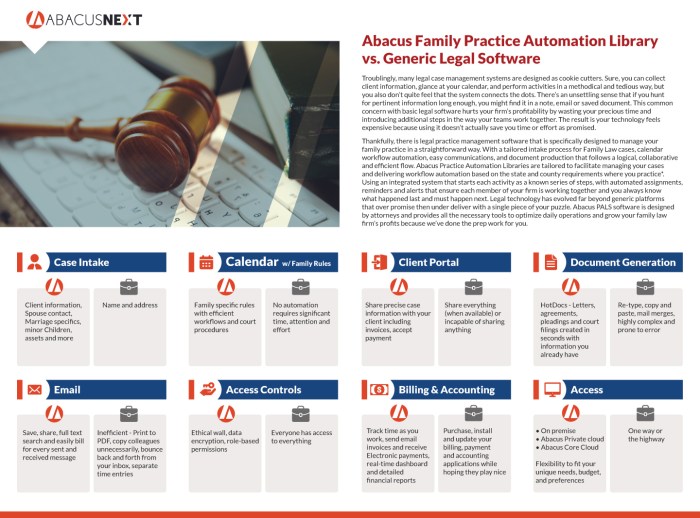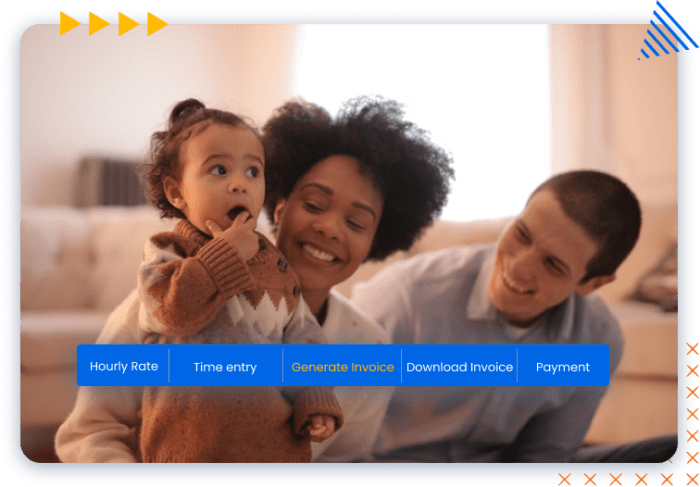Crm software for family law – The complexities of family law demand meticulous organization and efficient communication. Juggling client files, scheduling appointments, managing deadlines, and tracking communications can quickly become overwhelming. This is where a robust Customer Relationship Management (CRM) system steps in, offering a centralized hub to streamline your practice and enhance client service. This detailed guide explores the benefits, features, and selection criteria for CRM software tailored to the specific needs of family law professionals.
Understanding the Needs of Family Law Professionals
Family law practices face unique challenges that require specialized CRM functionalities. Unlike other legal specialties, family law often involves highly emotional clients navigating sensitive and personal matters. Effective communication, meticulous record-keeping, and seamless collaboration are paramount. A CRM system designed for family law should address these specific needs:
Key Features for Family Law CRM Software:, Crm software for family law
- Secure Client Portal: Allow clients secure access to their case files, documents, and communication history, fostering transparency and reducing administrative burden.
- Calendar and Scheduling: Integrated scheduling features to manage appointments, court hearings, and deadlines, minimizing scheduling conflicts and ensuring timely actions.
- Document Management: Centralized storage and management of all case-related documents, including contracts, pleadings, financial records, and correspondence, ensuring easy access and version control.
- Communication Tracking: Detailed logs of all client interactions, including emails, phone calls, and in-person meetings, providing a complete communication history for each case.
- Case Management: Robust tools to track case progress, deadlines, and milestones, allowing for efficient case management and improved workflow.
- Contact Management: Comprehensive contact management features to store client information, including contact details, family members, and relevant parties involved in the case.
- Financial Tracking: Integration with billing systems to track billable hours, expenses, and payments, ensuring accurate financial management and timely invoicing.
- Reporting and Analytics: Generate insightful reports on caseload, client demographics, financial performance, and other key metrics to improve practice management and strategic decision-making.
- Compliance and Security: Adherence to data privacy regulations (like HIPAA and GDPR) and robust security measures to protect sensitive client information.
- Integration with other legal tools: Seamless integration with e-signature software, court filing systems, and other legal technology tools to streamline workflows.
Choosing the Right CRM Software for Your Family Law Practice: Crm Software For Family Law
Selecting the appropriate CRM software requires careful consideration of your practice’s specific needs and budget. Here are some key factors to consider:
Factors to Consider When Choosing a Family Law CRM:
- Scalability: Choose a system that can adapt to your practice’s growth and evolving needs.
- User-Friendliness: Opt for intuitive software that is easy for your team to learn and use effectively.
- Cost: Consider the initial investment, ongoing subscription fees, and any additional costs associated with implementation and training.
- Integration Capabilities: Ensure the CRM integrates seamlessly with your existing software and tools.
- Customer Support: Choose a provider that offers reliable and responsive customer support.
- Security and Compliance: Prioritize software that meets industry standards for data security and privacy.
- Reviews and Testimonials: Research user reviews and testimonials to gauge the software’s effectiveness and reliability.
Top CRM Software Options for Family Law Firms
Several CRM platforms cater specifically to the needs of family law practices, offering a range of features and pricing options. Researching different options and comparing their features is crucial before making a decision. Some popular options include (Note: This is not an exhaustive list and specific features may vary):

Source: amicusattorney.com
- CaseFox: Known for its legal-specific features and robust case management capabilities.
- MyCase: Offers a comprehensive suite of tools for law firms, including client portals and document management.
- PracticePanther: A popular choice for its user-friendly interface and strong time tracking features.
- Clio Manage: A widely used CRM known for its robust features and integration options.
- Smokeball: Specifically designed for law firms, offering features such as document automation and billing.
It’s important to request demos and trials from several providers to determine which platform best suits your practice’s workflow and preferences.
Frequently Asked Questions (FAQ)
- Q: What is the average cost of CRM software for family law firms? A: The cost varies widely depending on the features, number of users, and provider. Expect to pay anywhere from a few hundred dollars per month to several thousand dollars per year.
- Q: How long does it take to implement a CRM system? A: Implementation time depends on the complexity of the system and your practice’s size. It can range from a few weeks to several months.
- Q: Do I need technical expertise to use a CRM? A: Most modern CRMs are designed to be user-friendly, requiring minimal technical expertise. However, some training may be necessary.
- Q: How can a CRM improve client communication? A: A CRM facilitates efficient communication by centralizing all client interactions, providing a complete communication history, and offering secure client portals for document sharing.
- Q: Can a CRM help with compliance? A: Yes, many CRMs offer features that help with compliance, such as secure data storage and audit trails.
Conclusion
Implementing a CRM system is a strategic investment that can significantly enhance the efficiency and profitability of your family law practice. By streamlining workflows, improving client communication, and providing a centralized hub for all case-related information, a well-chosen CRM can empower your firm to deliver superior client service while maximizing productivity. Take the time to research your options, consider your specific needs, and choose a system that will support your practice’s long-term growth and success.

Source: casefox.com
References
- American Bar Association
- Law.com
- (Add links to specific CRM software websites as needed)
Call to Action
Ready to transform your family law practice? Schedule a free consultation today to explore how the right CRM can optimize your workflow and enhance client satisfaction!
Clarifying Questions
What are the key features to look for in a family law CRM?
Essential features include secure client data storage, calendar and scheduling tools, communication tracking, document management, and reporting capabilities. Integration with other legal software is also highly desirable.
How much does family law CRM software typically cost?
Pricing varies widely depending on the features, vendor, and number of users. Expect to find options ranging from affordable monthly subscriptions to more comprehensive, higher-priced packages.
Is my client data secure in a family law CRM?
Reputable CRM providers prioritize data security with measures like encryption, access controls, and regular security audits. It’s crucial to choose a vendor with a strong commitment to data protection and compliance with relevant regulations.
How can CRM software improve client communication?
CRMs facilitate efficient communication through features like automated email reminders, secure messaging, and centralized communication logs. This ensures consistent and timely communication with clients, improving transparency and satisfaction.
